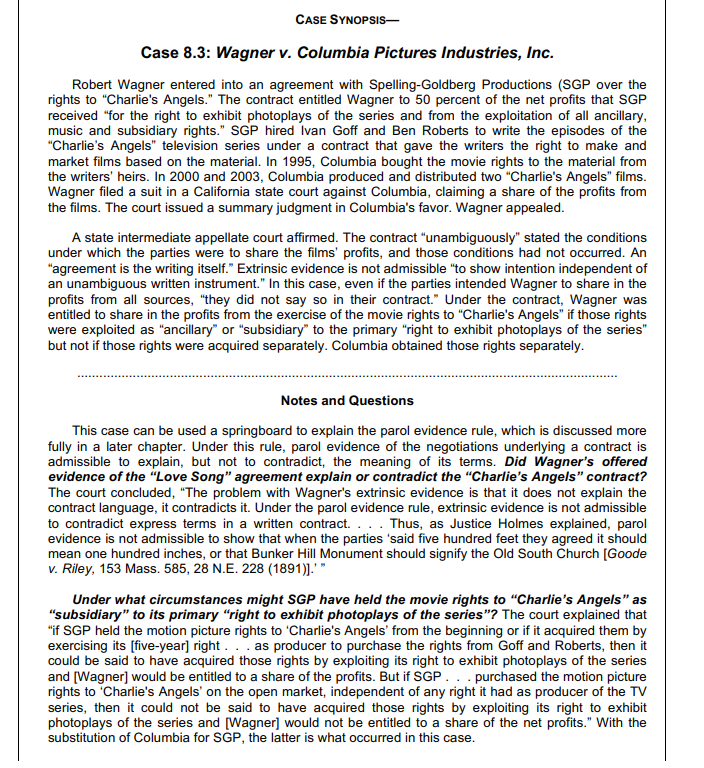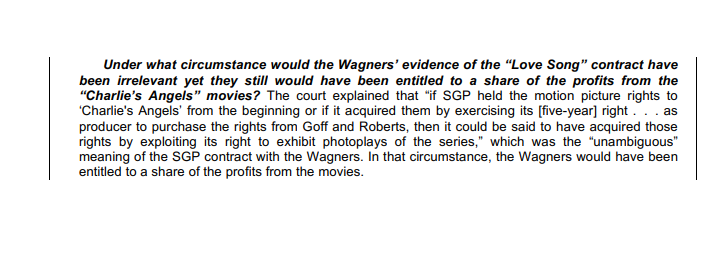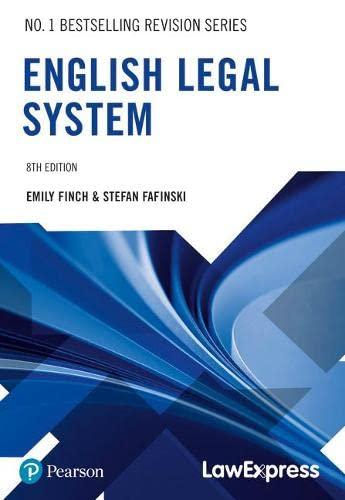CASE SYNOPSIS- Case 8.3: Wagner v. Columbia Pictures Industries, Inc. Robert Wagner entered into an agreement with Spelling-Goldberg Productions (SGP over the rights to "Charlie's Angels." The contract entitled Wagner to 50 percent of the net profits that SGP received "for the right to exhibit photoplays of the series and from the exploitation of all ancillary, music and subsidiary rights." SGP hired Ivan Goff and Ben Roberts to write the episodes of the Charlie's Angels" television series under a contract that gave the writers the right to make and market films based on the material. In 1995, Columbia bought the movie rights to the material from the writers' heirs. In 2000 and 2003, Columbia produced and distributed two "Charlie's Angels" films. Wagner filed a suit in a California state court against Columbia, claiming a share of the profits from the films. The court issued a summary judgment in Columbia's favor. Wagner appealed. A state intermediate appellate court affirmed. The contract "unambiguously" stated the conditions under which the parties were to share the films' profits, and those conditions had not occurred. An 'agreement is the writing itself." Extrinsic evidence is not admissible "to show intention independent of an unambiguous written instrument." In this case, even if the parties intended Wagner to share in the profits from all sources, "they did not say so in their contract." Under the contract, Wagner was entitled to share in the profits from the exercise of the movie rights to "Charlie's Angels" if those rights were exploited as "ancillary" or "subsidiary" to the primary "right to exhibit photoplays of the series" but not if those rights were acquired separately. Columbia obtained those rights separately. Notes and Questions This case can be used a springboard to explain the parol evidence rule, which is discussed more fully in a later chapter. Under this rule, parol evidence of the negotiations underlying a contract is admissible to explain, but not to contradict, the meaning of its terms. Did Wagner's offered evidence of the "Love Song" agreement explain or contradict the "Charlie's Angels" contract? The court concluded, "The problem with Wagner's extrinsic evidence is that it does not explain the contract language, it contradicts it. Under the parol evidence rule, extrinsic evidence is not admissible to contradict express terms in a written contract. . . . Thus, as Justice Holmes explained, parol evidence is not admissible to show that when the parties 'said five hundred feet they agreed it should mean one hundred inches, or that Bunker Hill Monument should signify the Old South Church [Goode v. Riley, 153 Mass. 585, 28 N.E. 228 (1891)].' " Under what circumstances might SGP have held the movie rights to "Charlie's Angels" as "subsidiary" to its primary "right to exhibit photoplays of the series"? The court explained that "if SGP held the motion picture rights to 'Charlie's Angels' from the beginning or if it acquired them by exercising its [five-year] right . . . as producer to purchase the rights from Goff and Roberts, then it could be said to have acquired those rights by exploiting its right to exhibit photoplays of the series and [Wagner] would be entitled to a share of the profits. But if SGP . . . purchased the motion picture rights to 'Charlie's Angels' on the open market, independent of any right it had as producer of the TV series, then it could not be said to have acquired those rights by exploiting its right to exhibit photoplays of the series and [Wagner] would not be entitled to a share of the net profits." With the substitution of Columbia for SGP, the latter is what occurred in this case.Under what circumstance would the Wagners' evidence of the "Love Song" contract have been irrelevant yet they still would have been entitled to a share of the profits from the "Charlie's Angels" movies? The court explained that "if SGP held the motion picture rights to Charlie's Angels' from the beginning or if it acquired them by exercising its [ five-year] right . . . as producer to purchase the rights from Goff and Roberts, then it could be said to have acquired those rights by exploiting its right to exhibit photoplays of the series," which was the "unambiguous" meaning of the SGP contract with the Wagners. In that circumstance, the Wagners would have been entitled to a share of the profits from the movies








